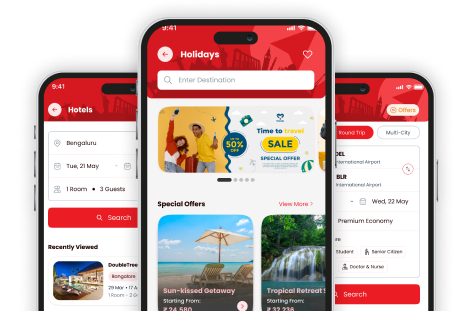best option to exchange your currency is to get it from an authorised agency or your bank before your Bali trip. If you find it difficult to find the Rupiah in India before you travel, it is advisable to carry US Dollars and get that exchanged in Bali, through proper channels.
Plastic money might not be of great use in Bali, so make sure you carry enough liquid cash. There are money changers in Indonesia, but be cautious while the transaction happens. One useful tip is to always ask for big notes and avoid any confusion while counting or getting conned. The best option is to get the exchange at the airport or at the commercial banks to avoid any complications.
At SOTC, we can advise you on the best possible options and rates.
Bali Currency
Being the focus of a host of popular travel shows, journals and many works of literature, the ‘Land of the Gods’, Bali’s charm is boundless; there is something exciting and pleasing for everyone. Bali, the very famous Indonesian island located to the west of Java in the Lesser Sunda Islands, is safe to travel even for solo female travellers.
Your Bali tour packages should include breath taking beaches, looming volcanoes, aromatic cuisine, lush terraced rice fields, picturesque coral reefs, idyllic retreats, gorgeous waterfalls, quaint yoga wellness and meditation centres, beautiful ancient temples, bold mountain peaks and a bevy of enriching culture and tradition—that’s how you define Bali. Talk to your tour operator on places to visit in Bali and plan accordingly.
Bali Currency information
Bali’s currency name is Indonesian Rupiah and is abbreviated as Rp. The currency code is IDR, which is Indonesian Rupiah. The name rupiah originated from the Sanskrit word, ‘rupyakam’, which means silver in Sanskrit. Earlier, Indonesians used the word ‘perak’, which also means silver while referring to rupiah. The rupiah is divided into 100 sen, inflation has badly hit those coins and banknotes denominated in ‘sen’ turning them outdated nonetheless. The rupiah became the official currency of Indonesia in 1946 while Indonesian nationalists were fighting for independence. And it has a lengthy history of uncertain economy many times and rising inflation due to which the currency has been revalued a number of times.
History of Bali currency
While Indonesian nationalists were fighting for independence, rupiah replaced a version of Netherlands Indies gulden, which got introduced in World War II during Japanese occupation. The Indonesian half of New Guinea and Riau Islands had their respective versions of rupiah earlier but subsequently, those were included into the national rupiah. However, the Bali island currency took a plunge deep down during 1950s and later in 1965, a new rupiah was introduced. Such low was the plunge that the rate of exchange was 1000 old rupiah as against 1 new rupiah.
One of the lowest valued currencies of the global financial market, Rupiah is still an upcoming player in the global economy. The coins are in the denominations of Rp 100, 200, 500, 1000 and currency notes are available in Rp 1000, 2000, 5000, 10,000, 20,000, 50,000, 100,000. And as Bali is one of the provinces in Indonesia, the entire official monetary transaction in Bali is controlled by Indonesian central bank named Bank Indonesia.
Best place to exchange currency in Bali
The next question which comes to your mind is the best place to exchange currency in Bali. There are four options for you to get Indonesian Rupiah.
- Once you reach Bali, the first thing you would go for before making any transaction is to exchange your currency that you are carrying to Indonesian Rupiah. There are quite a few authorised currency changers available.
- You can withdraw Indonesian Rupiah by using debit or credit card from ATM in Bali. But before that make sure that you are not charged way too much by your bank with respect to international withdrawal fee and local bank transaction fee.
- You can also carry traveller’s cheque from your bank from the country you are travelling. However, not all places in Bali do accept traveller’s cheques.
- You can carry Indonesian Rupiah from your country itself by exchanging your money before your date of travel to Bali.
The current rate of US$1 is 13,772.20 Indonesian Rupiah and 1INR is around 192 Indonesian Rupiah.
Digital Transactions in Bali
Like many other developing nations, Indonesia does lack in established cashless transaction methods, which is a major hindrance to a healthy digital economy growth. Although around 48% of the population has payments-ready smartphones, the most common method for online payment is online banking and ATM transfers and then followed by cash on delivery option. However, it is highly risky for business transactions in trusting a delivery person while engaging in handling cash. Moreover, it is time taking, adding on to cost of transactions, settlement delays et al. On top of it, online payments and ATM transactions cannot be done instantly as they are troublesome for customers. So as of now, only a small fraction of the total mode of payment in Indonesia accounts for cashless or digital transactions.
Tipping in Bali
With the lion’s share going to the owner’s pocket, workers of the service industry in Bali are extremely low-paid. Tipping is not at all obligatory in Bali. Although it is considered there as a concept practised in foreign nations, tipping is appreciated nonetheless. You should never feel that you are to tip. Likewise, they won’t expect anything from you but a small token of goodwill gesture will go a long way in the island of beautiful Bali. You may choose to give a 5 to 10% of tip of the total spending depending on the quality of service you receive.
....Read Less




